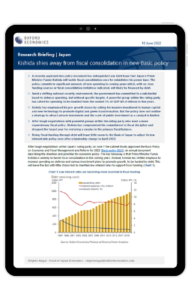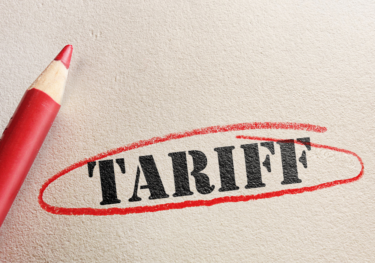Japan’s PM Kishida shies away from fiscal consolidation in new Basic policy
 After tough negotiations within Japan’s ruling party, on June 7 the cabinet finally approved the Basic Policy on Economic and Fiscal Management and Reform for 2022 (Basic policy 2022), an annual document describing the direction and priorities for economic policy. The key takeaway is that Prime Minister Fumio Kishida is unlikely to tackle fiscal consolidation in the coming years. Instead, Kishida has shifted emphasis to increase spending on defence and various investment plans to promote growth, to be funded by debt. This will leave the BoJ with little choice but to maintain low interest rates to support fiscal funding.
After tough negotiations within Japan’s ruling party, on June 7 the cabinet finally approved the Basic Policy on Economic and Fiscal Management and Reform for 2022 (Basic policy 2022), an annual document describing the direction and priorities for economic policy. The key takeaway is that Prime Minister Fumio Kishida is unlikely to tackle fiscal consolidation in the coming years. Instead, Kishida has shifted emphasis to increase spending on defence and various investment plans to promote growth, to be funded by debt. This will leave the BoJ with little choice but to maintain low interest rates to support fiscal funding.
What you will learn:
- Kishida has emphasised his pro-growth stance by calling for massive investment in human capital and new technology to promote digital and green transformation. But the policy does not outline a strategy to attract private investment and the scale of public investment as a catalyst is limited.
- After tough negotiations with powerful groups within the ruling party who want a more expansionary fiscal policy, Kishida has compromised his commitment to fiscal discipline and dropped the target year for restoring a surplus in the primary fiscal balance.
- Rising fiscal funding through debt will leave little room to the Bank of Japan to adjust its low interest rate policy even after a leadership change in April 2023.
Tags:
Related posts

Post
Japan’s BoJ outlook update – Rate hike is now more likely in January
We now believe that the Bank of Japan will wait until January to hike the policy rate. We previously assumed a 60% chance of a hike at the meeting on December 19, but recent media reports signal that more board members will likely prefer to wait to see more data to confirm the momentum of wage-driven inflation and US policy developments.
Find Out More
Post
Japan Key Themes 2025: Rising threats from external uncertainty
A secular labour shortage will continue to raise wages and inflation in a sustainable and irreversible manner in Japan.
Find Out More
Post
Adjusting our assumptions toward stronger US tariffs
In the second release of the November baseline, we updated our tariff assumptions, but the impact on GDP, inflation, and interest rates was small.
Find Out More